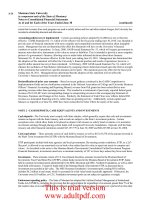montana-state-university-billings-elec
Bạn đang xem bản rút gọn của tài liệu. Xem và tải ngay bản đầy đủ của tài liệu tại đây (110.56 KB, 2 trang )
Montana State University-Billings
Suggested Pre-Chiropractic Curriculum
90 semester credits at bachelor's degree level:
A minimum of 90 semester credits (135 quarter credits) at the bachelor's degree level at a
college or university accredited by a regional accrediting agency recognized by the
U.S. Department of Education or an equivalent foreign institution.*
24 semester credits in the Life and Physical Sciences:
A minimum of 24 semester credits (36 quarter credits) in the Life and Physical Sciences. Of
these 24 semester credits (36 quarter credits), at least half must include a lecture and lab
component.
Minimum cumulative GPA of 3.0 on the best of the 90 semester credits:
A minimum cumulative GPA of 3.0 on a 4.0 scale on the best of the 90 semester credits (135
quarter credits) completed. The best 90 credits must include the 24 semester credits (36 quarter
credits) of Life and Physical Sciences.
Prerequisites
Required courses in the Life and Physical Sciences
General Chemistry I (with lab) – CHMY 141/142 College Chemistry I/Lab (4 credits)
Organic Chemistry I (with lab) – CHMY 321/322 Organic Chemistry I/Lab (4 credits)
Biology I (with lab) – BIOB 160/161 Principles of Living Systems/Lab (4 credits)
* Other biology courses listed below will also fulfill this requirement.
Recommended additional courses in the Life and Physical Sciences
General Chemistry II (with lab) – CHMY 143/144 College Chem II/Lab (4 credits)
Organic Chemistry II (with lab) – CHMY 323/324 Organic Chem II/Lab (4 credits)
Biology II (with lab) – BIOB 170/171 Principles of Biological Diversity/Lab (4 credits)
Physics I (with lab) and/or Physics II (with lab) – PHSX 205/206 College Physics
I/Lab and/or PHSX 207/208 College Physics II/Lab (4 credits each)
Biochemistry (with lab) – BCH 380/381 Biochemistry/Lab (4 credits)
Other science courses may qualify, BIOB 260/261 Cell & Molec Biol/Lab, BIOH 301/302
Human Anat & Phys I/Lab, BIOH 311/312 Human Anat & Phys II/Lab, BIOM 360/361 Gen
Microbiology/Lab. Students may check with the Office of Admissions to review science
prerequisites. (9/2013)
Why Basic Science prerequisites are important:
To ensure your academic success with a solid foundation
We want you to be successful in the doctor of chiropractic program at Northwestern Health Sciences University. Basic science courses,
including Biology, Physics, Inorganic and Organic Chemistry, are the foundation for the understanding of chiropractic science and the
application of chiropractic methods.
To successfully progress through our rigorous chiropractic curriculum, it is very important for you to have a solid foundation in the basic
sciences. In our experience, we have found that students who enroll in the College of Chiropractic having taken the proper sequence of basic
sciences courses as prerequisites are more likely to do well in their coursework.
The graduate-level basic sciences courses you will be taking in your first and second trimesters are very demanding. The stronger your
undergraduate background in the basic sciences, the more confident and capable you will be in meeting these challenges.
How Basic Science courses ensure your success
Biology and Inorganic Chemistry
Doctors of chiropractic are specialists in neuromusculoskeletal systems. These systems, especially the neuromuscular system, are
electrochemical systems. If you enter the College of Chiropractic with a solid background in biology and inorganic chemistry, you’ll understand
these fundamental concepts that will help you progress through the chiropractic curriculum:
membrane potentials
electrical and chemical gradients
capacitance, ion motion and force
binding of chemical transmitters to receptors and the interaction with drugs
Physics
Doctors of chiropractic are also biomechanical experts. Physics is very helpful in understanding the vectors and forces associated with line of
drive and the velocities of thrust - important concepts that directly apply to chiropractic methods.
In your prerequisite physics courses, you’ll also gain knowledge of work, power, force, and the effects of time – which are all very helpful in
understanding the science of chiropractic.
Organic Chemistry
Organic Chemistry provides the foundational knowledge base for understanding how the body is built, how it m anufactures and manages
energy, and how it uses raw materials to maintain and repair itself.
Organic Chemistry is necessary to understand Biochemistry, Cell Biology and Clinical Nutrition - courses you will be taking in the doctor of
chiropractic program.
We can help
Our admission representatives are here to help you plan your undergraduate curriculum. We can review your courses and suggest basic
science courses that will help ensure your success. Northwestern also offers accelerated basic science courses through the College of
Undergraduate Health Sciences to help you fulfill your prerequisites.









